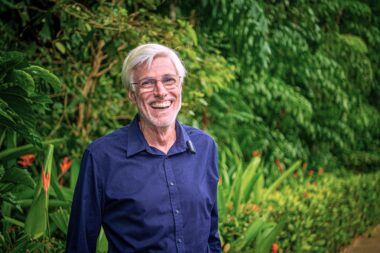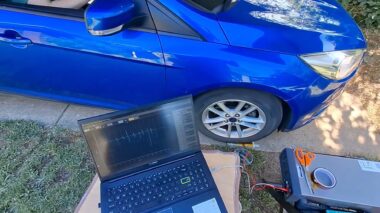Sensors are integral to modern life, but they rely on power from batteries that generate toxic waste when discarded.
According to CSIRO, the rate of lithium-ion battery waste in Australia is increasing at an alarming rate of 20 percent a year, with projections this waste could surpass 100,000 tonnes by 2036. In addition, approximately 264 million alkaline batteries reach their end of life each year. Only two percent of lithium-ion batteries, and five percent of alkaline batteries, are recycled.
Now an NSW Smart Sensing Network Grand Challenge Fund project is hoping to eliminate the reliance of sensors on disposable batteries by testing the fast production of perovskite photovoltaic (PV) cells, in the hope of creating a more sustainable sensor power source.
The Revolutionizing Indoor Sensor Power: Rapid Microwave Annealing for Ultra-low-cost Perovskite Solar Cellsproject is being led by Dr Binesh Veettil, a Senior Lecturer in the School of Engineering at Macquarie University.
“Perovskite cells offer continuous power, and are ideal for harvesting indoor light to power low-power sensors,” Dr Veettil says. “They are cost-effective when mass manufactured and they are suitable for roll-to-roll manufacturing as they can be screen-printed, slot-die coated, or spray-painted. Unfortunately the lengthy annealing time required is a challenge to be addressed to enable their widespread adoption.”
Annealing is a heat treatment process which is a critical step in fabricating PV cells. The fabrication of a high-efficiency perovskite cell requires 30 minutes of annealing on a hot plate.
“In the laboratory environment, we have demonstrated that the same results can be obtained in 30 seconds using microwave annealing,” Dr Veettil says. “When modified for the roll-to-roll setup of our project industry partner, Halocell Energy Ltd, we aim to increase the speed of the annealing process by 300 percent while producing the highest quality semiconductors. This will also help to reduce the energy requirement for annealing by 50 percent.”
Dr Veettil says the team’s breakthrough not only accelerates production but also enhances cell quality.
The project is a partnership with co-investigator Dr Robert Patterson from the School of Photovoltaic and Renewable Energy Engineering at UNSW and industry partner, Halocell Energy Ltd.
“Our goal is to demonstrate the feasibility of this technique in roll-to-roll manufacturing, paving the way for large-scale, eco-friendly indoor sensor deployment,” Dr Patterson says. “This project facilitates an easy solution: indoor-use-optimised PV cells combined with compact supercapacitors for energy storage. This approach not only addresses the pressing issue of toxic waste but also offers a practical benefit to end-users. By providing ‘install-and-forget’ sensors that have no downtime because of battery replacement, we facilitate continuous operation without the environmental burden.”
The initiative is poised to make substantial progress in powering smart sensors through clean technology, marking a significant step in sustainable innovation.
ENDS
About us:
The NSW Smart Sensing Network, a consortium of eight leading universities across NSW and the ACT, is a not-for-profit innovation network that brings together universities, industry and government to translate world-class research into innovative smart sensing solutions that create value for NSW and beyond.
Contact details:
Diane Nazaroff, NSSN Media Manager, 0424 479 199, [email protected].


